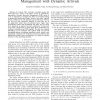Free Online Productivity Tools
i2Speak
i2Symbol
i2OCR
iTex2Img
iWeb2Print
iWeb2Shot
i2Type
iPdf2Split
iPdf2Merge
i2Bopomofo
i2Arabic
i2Style
i2Image
i2PDF
iLatex2Rtf
Sci2ools
GLOBECOM
2008
IEEE
2008
IEEE
Throughput and Delay of DSL Dynamic Spectrum Management with Dynamic Arrivals
Abstract—In modern DSL networks, crosstalk among different lines (i.e., users) is the major source of performance degradation. Dynamic Spectrum Management (DSM) refers to a set of techniques to mitigate the effect of crosstalk leading to spectacular performance gains. However the main research efforts in DSM aim at only physical layer performance whereas the true end user experience depends on what they see at the application rather than the physical layer. Upper layer performance metrics like throughput and delay may be much more important to improve the user satisfaction. To that end, we provide a framework to study upper layer performance by looking at scheduling and DSM together. We show how optimal scheduling can be combined with optimal DSM and provide throughput-optimal scheduling algorithms which require only polynomial complexity. We furthermore present extensions that significantly improve delay performance by using the specific structure of the underlying problem.
GLOBECOM 2008 | Layer Performance | Physical Layer Performance | Telecommunications | Upper Layer Performance |
| Added | 29 May 2010 |
| Updated | 29 May 2010 |
| Type | Conference |
| Year | 2008 |
| Where | GLOBECOM |
| Authors | Paschalis Tsiaflakis, Yung Yi, Mung Chiang, Marc Moonen |
Comments (0)

